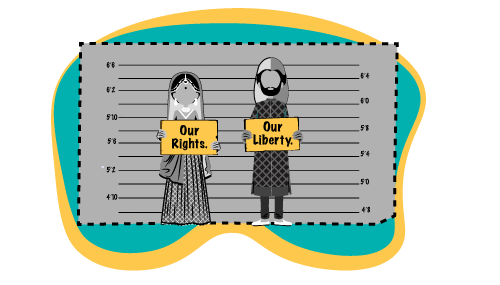Love Jihad: U.P Ordinance on the oxymoron

On 24th November 2020, the Uttar Pradesh government cleared the UP Prohibition of Unlawful Religious Conversion Ordinance 2020. Known in Hindi as Uttar Pradesh “Vidhi Virudh Dharma Samparivartan Pratishedh Adhyadhesh”. Infamously known as “Love Jihad” law, the phrase itself is not mentioned anywhere in the Ordinance. The Ordinance has been in the news for all the wrong reasons. A look at the controversial Act:
- The Ordinance applies to everyone belonging to any religion, provides for the regulation of conversion through prescribed declaration and giving notice to authorities for ruling out unlawful conversions in fraudulent manner.
- The objective of enacting this Ordinance in UP is to tackle the rising incidents of forced religious conversions through fraudulent ways – allurement, coercion, undue influence and the like such as luring into marriage professing love. This Act criminalizes forceful inter faith conversions.
- Offences and their fine / punishment have been categorized into 3 heads:
(i) Conversion done though “misrepresentation, force, undue influence, coercion, allurement or by any fraudulent means” in contravention of the law would face jail term of 1-5 years, and a minimum fine of Rs. 15,000.
(ii) Conversion of a minor woman or woman from Schedule Cast or Scheduled tribe would attract jail term of 3 -10 years and minimum fine of Rs. 25,000
(iii) Conversions done at mass level would attract jail term of 3 – 10 years and minimum fine of Rs. 50,000.
(iv) Marriage will be declared null and void if it is done with the sole intention of changing a girl’s religion. - The new law proposes that anyone wanting to convert into another religion must give in writing their intention to do so to the District Magistrate at least 2 months in advance. But the law also states that it is up to the person converting or seeking to convert that he / she is not converting fraudulently or forcefully.
The Ordinance has met with tremendous opposition. It is being viewed as politically motivated legislation with a view to communalize the society and promote politics of hate and divisiveness. Legally, experts view the ordinance as unconstitutional and against the Constitution of India as it denies the right to freedom of religion and restrictive of women’s right to freely choose their life partner. It was stated that the government’s reliance on a previous case was misconstrued as the issue in that decided case was not forceful and unlawful conversion. Intelligentsia from all walks of life have made written representation to the State government requesting to repeal the Ordinance. It is opined that laws framed are ambiguous and leaves room for the police machinery to interrogate any interfaith marriage and harass interfaith couples.
Statistics show that several arrests were made within the first month of when the Ordinance came into effect. However, several cases met with a dead end due to lack of evidence for unlawful conversion. In fact the very first case under the Ordinance was against a couple who stated they married out of their free will. They alleged harassment by the State machinery as the groom belonged to a minority community. Though arrested, the case could not hold good due to lack of evidence.
This is not the first such law in existence in India. History suggests that some princely states in India had laws restricting religious conversions to preserve their religious identity in the face of British invasion pre- independence. The judiciary stands firm in its view that no law should curb rights of any individual and should guarantee personal rights and liberty.

